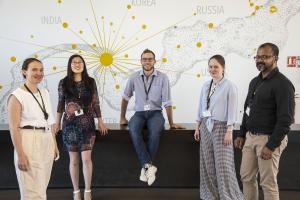A new generation of Monaco-ITER Fellows
The seventh group of Monaco Fellows has joined ITER with funding from a longstanding partnership between the Principality of Monaco and the ITER Organization. The Monaco-ITER postdoctoral fellowship is designed to support young researchers in fusion science and engineering.
Since 2008, five postdoctoral researchers have been chosen every two years for two-year research assignments at ITER. The latest group, from ITER Members China, India, Europe (France), and Russia, arrived between August 2020 and February 2021. Two of the Fellows have joined the Engineering Design Department, while three others are part of the Science, Controls & Operation Department.
Lei Chen (China): Lei earned her PhD from the University of Innsbruck, Austria. At ITER, she analyzes the damage to plasma-facing components caused by plasma disruptions to provide key input for the limits of those components and for the ongoing updates of the ITER safety files. Her interest in fusion stems from the global energy problem and her home country's need for clean energy. She also enjoys being part of a profession that is still developing, where there are new challenges to face and puzzles to solve.
Damien Colette (France): Originally from Nice, Damien has a PhD from Aix-Marseille University. His work, both in doctoral studies and at ITER, is focused on detecting the transport of impurities in plasma. Damien's passion for fusion sparked during an internship with the Swiss Federal Institute of Technology in Lausanne (EPFL). He worked with the TCV tokamak there and was drawn to fusion as he learned about its potential to solve some of the dilemmas of nuclear power—fusion creates far less radioactive waste and provides a cleaner, safer alternative to fission.
William Gracias (India): William holds a PhD from University Carlos III of Madrid and Aix-Marseille University through the Fusion-DC doctoral program. He is researching detachment, a process in plasma physics that will help preserve the integrity of divertor materials as they face the heat of plasma. William is driven to study fusion for its potential as a new source of energy. During his childhood, William experienced regular power outages: "I had to spend many a nights by candlelight as I prepared for my school and university exams." Seeking more reliable and renewable energy, he discovered fusion.
Anna Medvedeva (Russia): Anna earned her PhD in Plasma Physics from the Technical University of Munich and University of Lorraine through Fusion-DC. She creates synthetic diagnostic models, which can be used to model different stages of operation in the ITER Tokamak. Anna was inspired by a visit to an institute of nuclear physics and chose to study plasma physics because it can be applied to a wide array of real-world practices. Choosing a narrow specialization would mean eliminating other areas Anna is passionate about.
Valentina Nikolaeva (Russia): With a PhD from the Institute of Plasma and Nuclear Fusion in Lisbon, Valentina's research focuses on reflectometry to study plasma density and turbulence. Her journey to fusion began before she was born, as her father aided in the construction of the Chernobyl sarcophagus. He told Valentina that humanity needed a new source of energy, one that was safer. During her academic career, Valentina kept returning to her father's words. "Somehow, I was always choosing something related to physics," she says. "And then I fell in love with tokamaks."
The Monaco-ITER fellowship is a mutually beneficial relationship. The Fellows, just starting their careers, learn from specialists in their field at the most advanced fusion project on the globe. Meanwhile, ITER gains new ideas and fresh energy from these Fellows.
"The Monaco Fellowships allow the ITER Organization to match the brightest early-career professionals with issues that ITER must address," says Chief Scientist Tim Luce. He adds that, out of the 30 Fellows who have passed through ITER, at least 16 of them are still active in the fusion community. Ten Fellows continue to collaborate with ITER with the help of their own post-doctoral students.
The Fellowship has created a lasting impact on the fusion community and has formed a network that continues to multiply with each new generation of Fellows.


